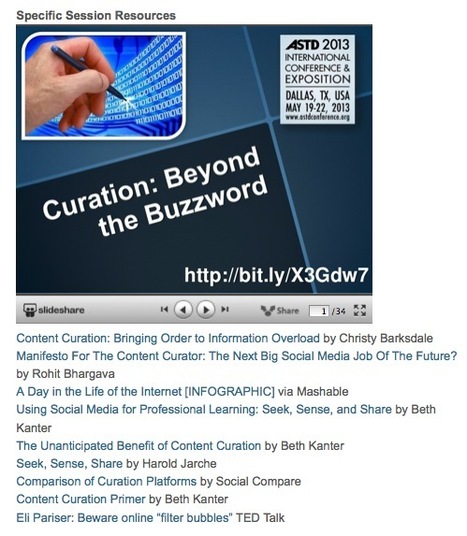Research and publish the best content.
Get Started for FREE
Sign up with Facebook Sign up with X
I don't have a Facebook or a X account
Already have an account: Login

What a Content Curator Needs To Know: How, Tools, Issues and Strategy
Curated by
Robin Good
Author: Robin Good

 Your new post is loading... Your new post is loading...
 Your new post is loading... Your new post is loading...
|

Robin Good's comment,
June 25, 2012 8:27 AM
Thank you Terry for reporting this: "the video is now private"
What do you make of it? Do you think it would have been better for the authors to provide a feedback or a comment to these issues rather than closing down the video for everyone? In a situation like this, what is more appropriate to do, in your view? Take down the material that may have some disputable parts, or discuss openly the issues with everyone while fully acknowledging possible overlooks and mistakes? 
Terry Elliott's comment,
June 25, 2012 8:45 AM
Robin, I actually went to Jane Hart's Social Learning Centre site (http://sociallearningcentre.co.uk/) and registered thinking that I had to be a member-still private. Then I joined the group that was based upon the webinar (http://sociallearningcentre.co.uk/groups/in-conversation-with-david-kelly-webinar/). No joy--still private. I left a comment on the video asking for help, but it has only been a short while.
I suppose what anyone makes of it depends upon how much slack is deserved. Jane Hart has been a serious asset in my search for answers to social media questions especially lately with her work at Internet Time Alliance, but... 1. Perhaps they realized that the webinar was a bit off the cuff. Half-baked might be less charitable, but I don't know because it's PRIVATE. I cannot make my own judgment and that is not good. 2. It might be painful, but sunlight is always best in public conversation. I would not take down the disputed parts but rather view them as starting points for another webinar 3. Don't you think they are missing a wonderful opportunity to drive traffic to their site? I do. It isn't too late. I would love to follow that, perhaps a Hangout on Air? I am working with a study group on P2PU that will open a discussion of curation for the National Writing Project's Digital Is network that is considering some of what you have already spoken to (https://p2pu.org/en/groups/curating-our-digital-lives/). Our goal is teacher-centered curation and I know my teaching fellows would value this conversation. Hell, we might just have it ourselves. I don't think you are wrong in your critique but without a public conversation we will never really know for certain, will we. Perhaps it would be a dialectic and a grander truth than yours or Kelly's would evolve from it. 
Robin Good's comment,
June 25, 2012 9:03 AM
Terry, I couldn't agree more with your excellent comments and thoughts.
I second them all and you have all of my support in promoting them. Thank you. |










This is an evergreen interesting topic. I was especially intrigued with the title up above that said "Social Media Job of The Future". There might be a lot of prescience (sp?) in that choice of words.
Anything from LnD Dave is pure hold and very practical. Enjoy'
A GREAT resource for the buzzword "Content Curation." Finally!